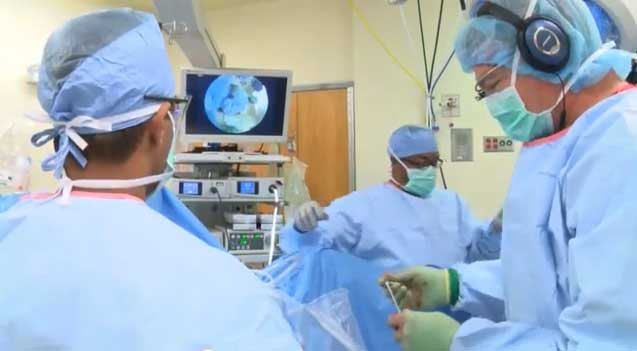Surgical residents who received anonymous feedback from their peers through a social networking site on their robotic surgery skills improved more than those who did not receive any peer feedback on their procedures, UCLA researchers found.
The study is the first to examine the use of social networking to facilitate peer review of surgical procedure videos, said senior author Dr. Jim Hu, UCLA’s Henry E. Singleton Professor of Urology and director of robotic and minimally invasive surgery in the urology department at the David Geffen School of Medicine at UCLA.
The study included 41 urology and gynecology residents from UCLA and the University of Michigan, who used a robotic surgery simulator to sew and tie two tubes together. The residents were randomized into one of two arms – an intervention arm in which the residents videotaped their efforts and posted the video on a Google+ group forum for anonymous review and comment by their peers in the same study arm, and a control arm in which study participants did not videotape or post their work for review.
The residents performed the same simulated robotic procedure three times. The study found that the residents in the intervention arm improved their technique in subsequent attempts, experiencing shorter completion times and earning better scores from the simulator for technical efficiency, greater accuracy and economy of motion.
“We have demonstrated that social networking can be a viable forum for coaching, both for residents honing their craft as well as practicing surgeons,” Hu said. “Technique matters, regardless of what type of surgery you’re doing. Surgeons who invest time in reviewing their techniques on video and seek the feedback and coaching of others ultimately will do better in terms of performance.”
The study appears in the early online edition of the peer-reviewed journal Annals of Surgery.
Hu said online peer review of demonstrated technique may one day become a paradigm for giving surgeons the privileges to operate at some medical institutions.
Hu said that because this platform is anonymous and accessible without time restraints or requiring a coach to be in the operating room during an procedure, it can greatly improve the quality of surgery among trainees, young surgeons who just finished training and more experienced surgeons seeking to refine their technique or adopt new technologies with challenging learning curves, such as robotic surgery.
After viewing the video, posted anonymously on the Google+ group forum, the residents in the intervention arm, also anonymously, would post comments on the performance and offer tips for improvement, Hu said. Comments included such suggestions as “be a little easier on the tissue” and “zoom in with the camera for better visualization.”
Hu said certain medical specialties can be slow to adopt new technologies, so this would provide an “egoless” opportunity to improve technique. Additionally, more experienced surgeons often don’t have time to coach younger surgeons, while older, more proficient surgeons can be reluctant to seek help from junior surgeons.
“Surgery can be very hierarchical,” he said. “When the robot came out a decade ago in urology, the people that really embraced it were the younger doctors. Many more established surgeons were resistant, claiming it wasn’t as good as open surgery,” Hu said. “It can be very humbling for the more experienced surgeons to get coached by surgeons with less prestige.”
However, using online peer review through social networking protects the identities of those reviewing and commenting and those whose craft is being examined. Surgeons can check their egos at the digital door, Hu said.
“Our study demonstrates the efficacy of peer feedback through social networking, a novel paradigm for technical mentorship. A benefit of using social networking as a forum is that it may serve as a vehicle for neophyte surgeons to receive mentorship from experts without the limitation of geographic distance or time constraints,” the study states. “Peer feedback of the online surgical video offers anonymity for all involved. and therefore removes potential barriers due to competitive surgeon egos. It may be a paradigm for continuous technical improvement beyond residency or fellowship training, which is critical with rapidly adopted new technologies such as robotic surgery.”


